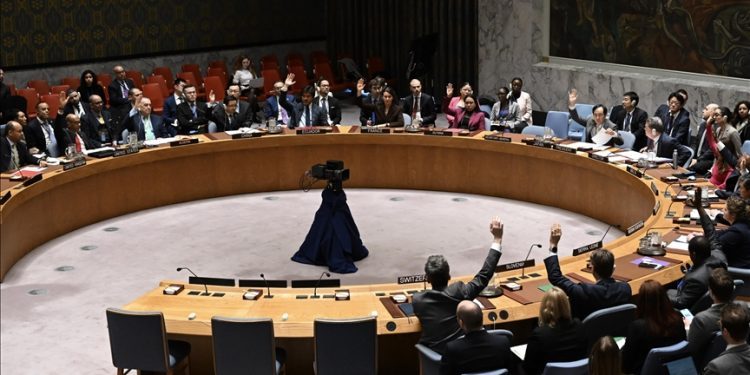HAMILTON, Canada
Kosovo and Serbia traded sharp accusations Tuesday at a UN Security Council session on the latest UN Mission in Kosovo (UNMIK) report, with Pristina calling the mission a costly relic that must be closed, while Belgrade urged the council to continue it.
Donika Gervalla-Schwarz, Kosovo’s foreign minister, rejected the terminology used by Belgrade, saying: “‘Kosovo and Metohija’ is a clear expression of the hegemonic ambitions of Serbia over Kosovo.”
Serbia, which has never accepted Kosovo’s 2008 declaration of independence, still refers to the country by the name it had when it was still part of Serbia.
She said of Kosovo’s neighbor: “In the present, Serbia is a real threat to the region … We see the systematic spread of propaganda preparing a military aggression against our country.”
Pointing to Serbian military activities, she said Serbia has a “military machine equipped by far beyond what is necessary for defense equipped even by Russia and China,” citing recent exercises, including one in China.
Gervalla-Schwarz insisted Belgrade’s actions reflect broader geopolitical aims, adding, “It’s not about four small municipalities, it’s about Russia, its allies and geopolitics,” apparently referring to four districts of Kosovo containing municipalities that have an ethnic Serb majority. Those municipalities have led to tensions between Kosovo and Serbia.
“For a reason, many call it little Russia, because Russia is deeply embedded in Serbia,” she added.
Dismissing the UNMIK report on Kosovo’s future as “biased and incomplete,” she said: “It will surely not be the biased UNMIK report that defines the future of our region.”
She also called for halting its mission, arguing: “UNMIK has to be closed. It is a huge waste of UN money. It serves no purpose anymore.”
– Cross-border tensions
But Marko Djuric, Serbia’s foreign minister, argued that the reality on the ground is far more dire for Kosovo Serbs, saying that no report “captures the full horror unfolding daily.”
Calling the situation “the shattering of human lives” and a “systemic denial of rights,” he accused Kosovo of attacking agreements and escalating tensions.
Djuric said Kosovo’s security policies are heightening risks in the Balkans, pointing to what he called “the ongoing militarization of Kosovo,” and arguing that Serbia remains committed to peace.
He stressed that Belgrade will continue to defend the rights of Serbs in Kosovo. He urged the Security Council “to uphold UNMIK fully, condemn abuses of Serbs’ rights, and defend international law as the bedrock of security.”
Kosovo declared independence in 2008, and 108 countries have since recognized it as such, including the US and Türkiye. Serbia, however, considers Kosovo part of its territory.
Recent years have seen high tensions between the two on issues such as regions of Kosovo with large ethnic Serb populations, sometimes leading Serbia to amass its troops along the border.






